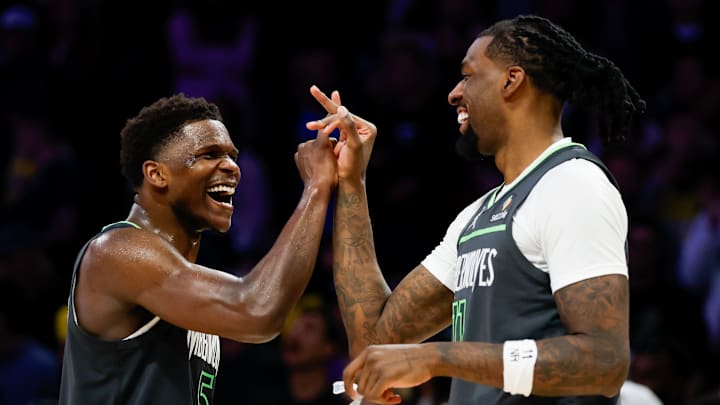The Minnesota Timberwolves exposed the Los Angeles Lakers’ lack of size and traditional center play in their first-round playoff series. As a result, the Lakers upgraded their center play in free agency by signing Deandre Ayton. On paper, this signing makes a lot of sense, and Ayton is undoubtedly a massive upgrade from Jaxson Hayes. However, Ayton isn’t an ideal fit next to Luka Dončić, and the Lakers will still have plenty of problems with bigger teams, including Minnesota. After this move, the Wolves are still clearly a better and more well-rounded team than the Lakers.
Ayton's fit with the Lakers isn't ideal
Luka thrives next to lob threats and defensive-minded centers such as Daniel Gafford and Dereck Lively. At 7 feet tall with tons of strength and athleticism, Ayton should be a perfect fit next to Luka. Regardless of Ayton’s physical gifts, he isn’t a lob threat and often settles for mid-range jumpers. Notably, this past season, only 5.3 of Ayton’s 11.7 field goal attempts were at the rim.
While there will be some nice pick-and-pop actions between Luka and Ayton, Dončić prefers more of a traditional lob threat to maximize his playmaking. Ayton's 1.13 points per possession as a roll man ranked in the 56th percentile this past season, which is fairly low given his physical gifts. Moreover, Ayton’s 14.4 points per game this past season were tied for a career low.
Now, it could be argued that Ayton will become more of a rim runner with Luka’s playmaking prowess. However, his stats last year are similar to his rim numbers with the Phoenix Suns while playing alongside an all-time great playmaker in Chris Paul (outside of an outlier year in 2020-21.) Simply put, rim running just isn’t Ayton’s game.
Ayton also averaged just 1.5 free throws this past season, highlighting a lack of offensive aggression. Undoubtedly, the Lakers will need Ayton to buy into more of a screener and lob threat role. This will include him setting harder screens and rolling to the basket more. However, it remains unclear if he can do this.
The Wolves have clear advantages over the Lakers
Defensively, effort has been a key concern for Ayton throughout his career. Despite having the tools to be a high-level defender and rim protector, Ayton hasn’t been able to put it together. Furthermore, you can attack him on switches at times. In a matchup against the Wolves, Anthony Edwards could certainly expose Ayton on switches.
He also isn’t a good enough rim protector to contain the Wolves' high-powered interior attack. Notably, the Wolves averaged 50 points in the paint against LA in the playoffs. The Lakers don’t have a good enough defense to make up for some of Ayton’s defensive concerns, especially after losing Dorian Finney-Smith.
Without many other options on the open market, Ayton feels likely to be the Lakers' lone rotational center. It’s one thing for Ayton to be part of a well-rounded center rotation. But the Lakers are essentially counting on Ayton to solve all their center problems, which is incredibly risky. Especially compared to the Wolves' loaded frontcourt rotation of Julius Randle, Naz Reid, and Rudy Gobert. Other teams, including the Denver Nuggets and Houston Rockets, have made sizable improvements.
However, landing Ayton doesn’t move the needle enough for the Lakers. When comparing the two rosters, the Wolves are clearly more complete on both ends of the court. Overall, Wolves fans should be delighted they still have a leg up on the Lakers.
